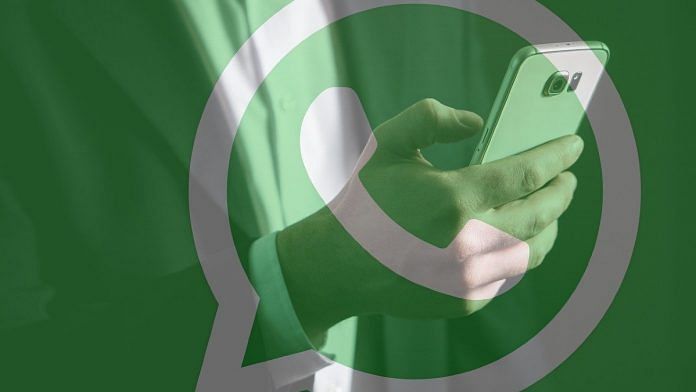New Delhi: Earlier this week, WhatsApp began sending in-app notifications to users about changes to its policy and terms of service, indicating that user data would be shared with its parent company, Facebook.
Users will have to agree to the changes, that are set to kick in on 8 February, to continue using the application.
The important changes to note are how user data will be processed henceforth, how businesses can use Facebook services to manage WhatsApp chats, and how WhatsApp partners with Facebook to “offer integrations” with products from Facebook Inc.
The news has raised concerns about user privacy and how much data Facebook will be able to access, given that the app now supports financial transactions and e-commerce.
To be clear, WhatsApp’s policy has always said it shares information with Facebook. But the latest update has one significant difference.
This isn’t the first time WhatsApp is facing privacy concerns. In 2019, it became a concern world over including in India, when it came to light that hackers were able to use the application to spy on targeted users using the spyware ‘Pegasus’.
However, since 2016, WhatsApp has enabled end-to-end encryption, which means message and call content is not readable to WhatsApp.
Also read: Spying or hacking — nothing is hurting WhatsApp’s status as India’s top messaging app
The key change
What has set this terms & policy update apart from earlier ones is that it does not give WhatsApp users the choice to not share information with Facebook.
While WhatsApp has had a data sharing model for sometime now, users could opt to not have their data shared with Facebook.
WhatsApp’s last policy version from July 2020 and the earlier December 2019 version say: “As part of the Facebook family of companies, WhatsApp receives information from, and shares information with, this family of companies. We may use the information we receive from them, and they may use the information we share with them, to help operate, provide, improve, understand, customize, support, and market our Services and their offerings.”
However, both these policy versions had a section saying: “…you can choose not to have your WhatsApp account information shared with Facebook to improve your Facebook ads and products experiences. Existing users who accept our updated Terms and Privacy Policy will have an additional 30 days to make this choice by going to Settings > Account.”
The updated policy version that comes into effect in February 2021 no longer has this section, giving users no choice in the matter of sharing information with Facebook if they wish to continue using the application.
Also read: Govts want backdoor entry to encrypted WhatsApp texts. It can also be backdoor for hackers
What kind of data will WhatsApp share
WhatsApp says it “currently” shares the following information with Facebook companies:
A user’s account registration information (like phone number), “transaction data, service-related information, information on how you interact with others (including businesses) when using our Services, mobile device information”, and the user’s IP address. The IP address is a string of numbers assigned to a device by an internet service provider and can be used to track the physical location of a device.
In addition, WhatsApp shares other user-related information with Facebook based on user consent and may share “other information identified in the Privacy Policy section entitled ‘Information We Collect’”.
Under the ‘Information We Collect’ section, according to the January 2021 policy, the company lists a user’s payment and transaction data, and gives more detail about what kind of data will be collected under ‘Transactions And Payments Data’.
“If you use our payments services, or use our Services meant for purchases or other financial transactions, we process additional information about you, including payment account and transaction information. Payment account and transaction information includes information needed to complete the transaction (for example, information about your payment method, shipping details and transaction amount).”
The previous policy update (July 2020) only briefly explained ‘Transactional information’ as: “If you pay for our Services, we may receive information and confirmations, such as payment receipts, including from app stores or other third parties processing your payment.”
Also read: Stigma of fake news is locking WhatsApp out of India’s lucrative digital payments market
What do the changes mean for users
What this means is that WhatsApp may now share more user information with Facebook than before. If users don’t click on the ‘accept’ button to agree to the new policy and terms, then users will not be able to continue using WhatsApp.
Other messaging apps, such as Signal and Telegram that are popular for their encrypted services, may see a boost due to this, or even the basic short message service (SMS) provided by your network provider.
Also read: How did leaked Bollywood ‘drug chats’ affect WhatsApp? Its downloads saw 25,000/day jump




Most users are concerned about their conversations on watsapp. Does that continue to remain secure or are they reviewing and transferring that as well to understand customer behaviour?
Leave WhatsApp.
Join Discord and Signal.
More functionalities and easy to use.
FB is an unscrupulous company. I don’t trust it. Criminals have used FB to stalk, burgle, hack users. I am stopping Whatsapp use on 7th Feb. In short, THERE IS NO FREE LUNCH in this world.